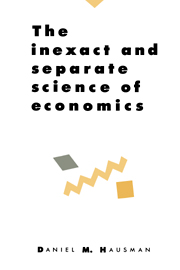Book contents
- Frontmatter
- Contents
- List of figures
- Dedication
- Introduction
- Part I Introduction, structure, and strategy
- Part II Theory assessment
- 8 Inexactness in economic theory
- 9 Methodological revolution
- 10 Karl Popper and falsificationism in economics
- 11 Imre Lakatos and economic methodology
- 12 Economics as an inexact and separate science
- 13 On dogmatism in economics: the case of preference reversals
- Part III Conclusion
- Appendix: An introduction to philosophy of science
- Bibliography
- Index
12 - Economics as an inexact and separate science
Published online by Cambridge University Press: 04 August 2010
- Frontmatter
- Contents
- List of figures
- Dedication
- Introduction
- Part I Introduction, structure, and strategy
- Part II Theory assessment
- 8 Inexactness in economic theory
- 9 Methodological revolution
- 10 Karl Popper and falsificationism in economics
- 11 Imre Lakatos and economic methodology
- 12 Economics as an inexact and separate science
- 13 On dogmatism in economics: the case of preference reversals
- Part III Conclusion
- Appendix: An introduction to philosophy of science
- Bibliography
- Index
Summary
The last three chapters canvassed the main alternatives to the method a priori. None shows how economists can rationally commit themselves to a highly inexact science such as economics. Each of the alternatives runs into internal philosophical difficulties, and (except Koopmans') each implies drastic changes in methodological practice.
Perhaps methodological practice in economics is due for a major overhaul. But first let us look again at that practice to see whether it is as mistaken as has been alleged. Since that practice appears largely to conform to the inexact method a priori (summarized on pp. 147–8 above), its appraisal seems to turn on the appraisal of the inexact method a priori.
The inexact deductive method has been subject to logical, methodological, and practical criticisms:
The logical criticism maintains that inexact (ceteris paribus) laws are scientifically illegitimate, because they are meaningless or unfalsifiable. But the arguments of sections 8.2 and 8.3 show that qualified claims are not meaningless or untestable and, as argued above in section 10.2, no interesting scientific claims are logically falsifiable.
The methodological criticism of the inexact deductive method is that it is too dogmatic, since it rules out the possibility of disconfirming the basic “laws.” Adhering to the deductive method thus, it is alleged, impedes the progress of economics and leads to the sort of ad hoc response to apparent disconfirmation characteristic of a degenerating research program. I shall accept this criticism of the method, but not of economists, who, despite appearances, do not adhere to it.
[…]
- Type
- Chapter
- Information
- The Inexact and Separate Science of Economics , pp. 205 - 226Publisher: Cambridge University PressPrint publication year: 1992
- 1
- Cited by



